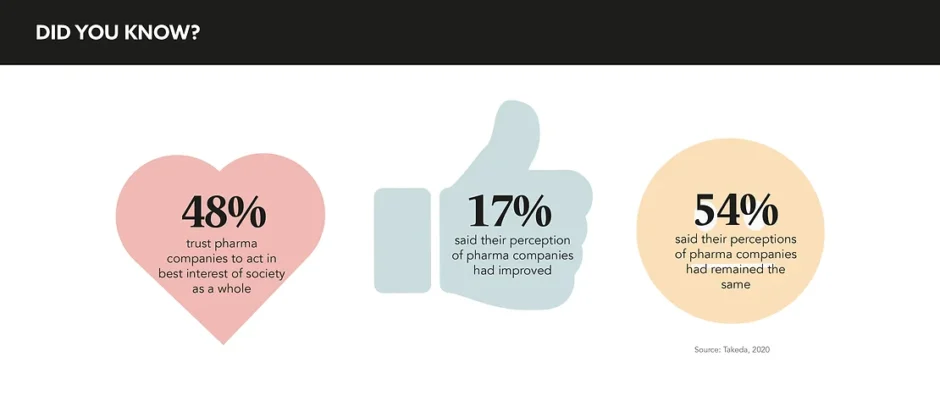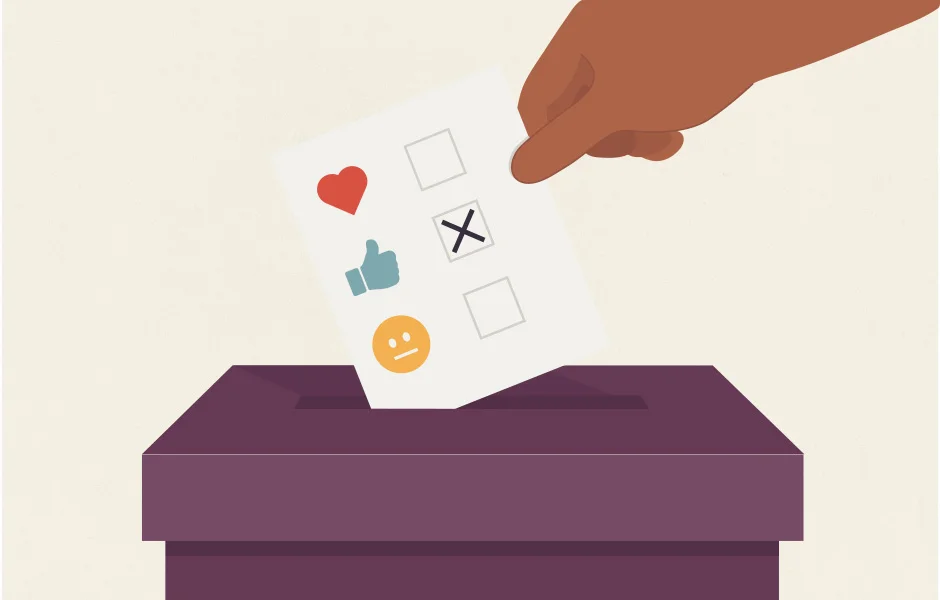The pharmaceutical industry has long struggled with its reputation, but 2020 offered an opportunity for reform. How has their response to the crisis affected perceptions, or is misinformation still getting in the way?
Words by Michaila Byrne
In 1915, the UK’s Parliamentary Recruiting Committee began circulating a now infamous campaign ad: a sketch of a father surrounded by his two children, asking him: ‘Daddy, what did you do in the Great War?’ Nearly a century later we are facing a similar question: ‘what did you do during the COVID-19 pandemic?’ For the pharmaceutical industry, the answer is simple: a heck of a lot.
The year 2020 will be remembered as one of the most challenging in modern times, but for pharma it presented a once-in-a-lifetime opportunity to showcase its work, demonstrate its value, and be part of the solution to a worldwide problem. The public waited with bated breath, scientists and executives worked tirelessly behind the scenes, and within 12 months it was announced that the industry had produced multiple approved vaccine candidates. With the industry front of mind and making daily headline news, it begs the question: are public perceptions of pharma finally changing for the better?
It is hardly breaking news that pharma has struggled with its reputation, never quite achieving the levels of trust that it aspires to. Due to its conduct having an unparalleled impact on health and quality of life in society, it is rightly under intense levels of scrutiny and held to the highest of standards.
“The public’s view of the pharma industry has typically been somewhat negatively informed by high drug price headlines and by movies like The Constant Gardener and, more recently, Amazon’s Dark Water,” acknowledges Jon Tipple, Global Chief Strategy Officer, FutureBrand.
When it comes to public perceptions, pharma has historically leaned toward the bottom tier, as Rob Jekielek, Managing Director, Harris Poll, puts it “…not quite at the level of tobacco, but nowhere near any of the major industries like financial services, auto[mobiles], tech[nology], or even retail”. But it appears that pharma’s reputation is in rehabilitation, with perceptions set to change as the industry is now being seen in a fresh, more flattering light.
The Harris Poll noted an almost doubling of positive equity for the industry in 2020. “Think of it as moving from around 30% positive to now about 55% percent positive – it’s actually a 23% increase on positive reputation, which is the biggest of any industry,” confirms Jekielek. And as Pierre Bourdage, Global Head of Biopharmaceuticals, Sandoz, points out, vaccine candidates aren’t the only way that pharma has showcased value since the outbreak of coronavirus.
“This year, pharmaceutical companies have had the opportunity to show how we care for people, through donations of important medicines to treat COVID-19, planning and collaborating across the industry to ensure that we continued to supply critical medicines even during an unprecedented demand surge.” Pharma is also a notoriously competitive industry, so it is unusual for insiders, let alone the public, to see companies collaborate and show synchronicity in this way.
“Industry perception is definitely improving amongst the more informed public; that’s to say professionals, investors, and managers who are aware of and actually know something about the industry and its most prominent players. Will this filter through to the more general public? Probably,” predicts Tipple.
Referencing the findings of the Caliber study, Ludivine Delattre, Head of Health, Porter Novelli, highlights how smaller pharma is being perceived as more trusted. “I believe that the presence of BioNTech, a founder-led company alongside Pfizer; Oxford University, academic and independent alongside AstraZeneca; and Moderna, a growing biotech alongside the other big pharmas, have been key drivers of positive perceptions.” This kind of progress is promising; however, polls are still reporting varying results and the jury is out on whether a substantial change in reputation has taken place or whether it will persevere.
Reflecting on 2020, Takeda published a report ‘Pharma: Repurposed?’ which analysed present-day perceptions. “Our research showed that COVID-19 has, as yet, had little positive impact on perceptions of pharmaceutical companies. Less than 1/5 of UK adults said their impression of pharmaceutical companies had got better,” reports Jon Neal, UK & Ireland Managing Director, Takeda. In fact, over 1/2 said their impression had stayed the same, he adds.
A more topical reason to proceed with caution is the politicisation of science, the influence of social media, and the rise of polarisation. Misinformation is more of a threat now than at any other point in history.
As José Maria Guido Avila, Global Lead, HCP Marketing, Sanofi points out: “Misinformation has proliferated in social media, giving a voice to anti-vaccination groups, spreading false information, and conspiracy theories… for this reason, I would not dare to say that the public opinion has shifted.” A deliberate and concerted effort to counter misinformation is vital, as well as proving that profit and business are always second to the health of patients and the public. Now is the time to cast aside fears of compliance or appearing ‘too promotional’, to open dialogues with the general public and embrace opportunities for the industry to speak for itself.
Referencing both a BBC Panorama programme and Pfizer’s Head of Vaccine R&D Kathrin Jansen’s appearance on CBS News’ 60 Minutes in the US, Jekielek states: “She has a very powerful personal story and she’s not a businessperson per se, she’s a real researcher. It creates these unique opportunities for people to have a very different kind of lens on the industry: the people who are making a difference, how and why they are doing what they are doing.”
Delattre also supports initiating this kind of activity. “The reputational challenge moving forward lies in telling people about the genuine good that big pharma does for society on a smaller, more human scale, with authenticity and humble passion.”
The reputational challenge moving forward lies in telling people about the genuine good that big pharma does for society
At its core, reputational shifts for pharma lie in increased transparency, something that is in the interest of both the industry and public health. COVID-19 has made the public desire openness from their politicians and clinicians, and there is an entrenched tendency in pharma toward caution, bordering obscurity. Neal advises: “There is a need for greater educational outreach on how the pharmaceutical industry operates, particularly the ‘molecule to medicine’ journey of innovation, to help increase public knowledge.”
Commitments to stable pricing, making vaccines available and accessible to all, addressing health inequities when it comes to race and gender, and introducing more environmentally sustainable practices are all key priorities for pharma going forward if they want to sustain any shift in reputation.
Whether 2020 will have a lasting impact on public perceptions of pharma may still be up for debate, but one thing that cannot be contested is pharma’s leading role in combatting one of the biggest global crises in recent memory. When we look back on this period and ask, ‘what did you do during the pandemic?’ no-one will dispute pharma’s prominence, but it does not stop there.
Now is the moment to seize this spotlight, hold the public’s attention, and take ownership of the narrative to create substantial change. If pharma truly seeks a reputational revamp, they need to sustain this newfound momentum to transform from the faceless baddy into the misunderstood antihero, who gave their all to take down the villain that terrorised the planet.










